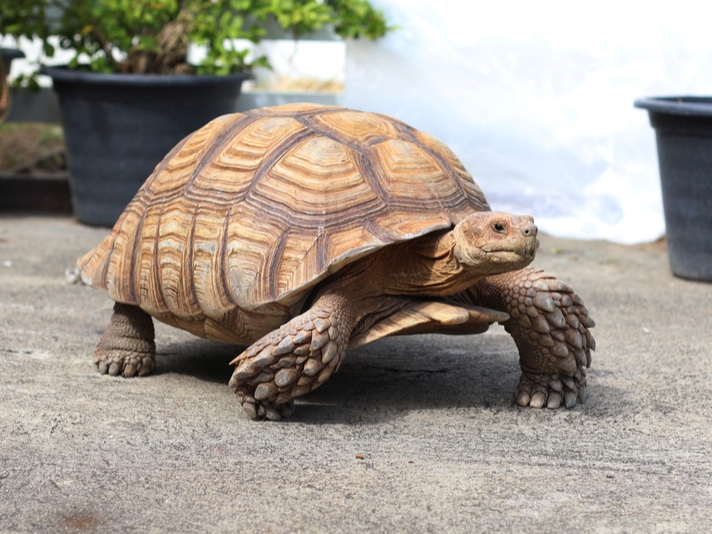Are there any pesticides or chemicals that can be used around tortoises?
Q. My husband and I have two sulcata tortoises. Recently we found a fire ant hill in our yard. We’re wondering if you know of any nontoxic ways of killing insects without poisoning the grass that the tortoises graze on. If you know of anything that might help us, please let me know. Any information would be a great help.
A. Good question, however, one with no simple answer, especially when tortoises are involved. Usually, when dealing with insects around aviaries, I recommend using ivermectin, an injectable dewormer licensed for horses and farm animals. However, this medication, while often utilized in herp medicine for lizards (other than the giant skinks) and snakes, is quite dangerous to tortoises. Ivermectin can cross the blood-brain barrier, a blood vessel net that prevents most drugs from crossing into the brain, in tortoises (and shelties, for you dog owners out there!)
Ivermectin can be mixed with sweet syrup or with grits or oats with something sweet added to attract the insects. If left out, either in small, low containers, or sprinkled near ant hills, it will be readily consumed, killing the ants. It also works well for cockroaches and other insects. Because it is a dewormer that targets insects, as well as certain internal and external parasites on animals, it doesn’t affect the grass or environment in any unsafe way. But, I hesitate to recommend using this concoction in your tortoise pen, in case one should ingest any ivermectin, which could prove fatal.
If you can ensure that you can keep your tortoises from having direct contact with the ivermectin, then that may be your best bet to control the fire ants without resorting to more dangerous insecticides. You may also wish to employ the services of professional pest company who is familiar with working around animals, especially herps. They often can provide a valuable service. Of course, you should do your homework first, and ask around to any local herp breeders and pet retailers to see if they can recommend a pest control company in your area.
If you decide to give the ivermectin a try, you can purchase cattle ivermectin, 1 percent solution, from a feed store (or you can ask your herp veterinarian about purchasing some from their office). There is no hard and fast recipe for preparing your ant killer. One or 2 milliliters mixed into 8 or 10 milliliters of honey, corn syrup or other enticing (to ants, anyway) liquid should be adequate. It won’t really dissolve in the syrup, but it can be dispersed throughout. If you choose to use grits, oats, cornmeal or something like that, mix 1 or 2 milliliters into a few tablespoons of the dry meal along with a few milliliters of a sweet syrup, tossing it well to disperse it. Next, pour some of the mixture right near the opening of the anthill and let them bring it down into the tunnels for ingestion. You can reapply as needed. But, just be sure to keep the tortoises away from the mixture so that they cannot eat any of it at all.
I hope this helps. I live in Florida as well and also have large tortoises, and I am constantly battling the fire ants. I suffered a bunch of nasty bites myself last week, and they are always quite painful to endure, both immediately afterwards and for days after! So, go get them!
Margaret A. Wissman, DVM, DABVP has been an avian/exotic/herp animal veterinarian since 1981. She is a regular contributor to REPTILES magazine.
Need a Herp Vet?
Find a herp vet with our comprehensive reptile vet directory. If you cannot find a herp vet using our reptile vet directory, a good place to go is the Association of Reptilian and Amphibian Veterinarian (ARAV) web site at www.arav.com.


